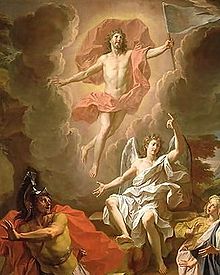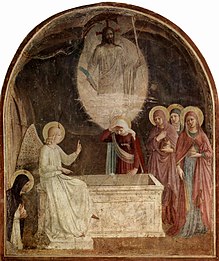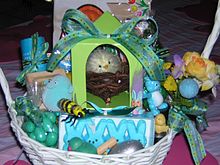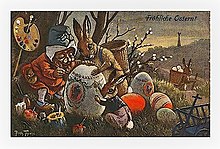Easter
Appearance
(Redirected from Easter Sunday)

Easter is the central feast in the Christian liturgical year. According to the Canonical gospels, Jesus rose from the dead on the third day after his crucifixion. His resurrection is celebrated on Easter Day or Easter Sunday (also Resurrection Day or Resurrection Sunday). The chronology of his death and resurrection is variously interpreted to have occurred between AD 26 and 36. Easter marks the end of Lent, a forty-day period of fasting, prayer, and penance. The last week of the Lent is called Holy Week, and it contains Good Friday, commemorating the crucifixion and death of Jesus. Easter is followed by a fifty-day period called Eastertide or the Easter Season, ending with Pentecost Sunday.
Quotes
[edit]
Hear the shouts along the King’s highway;
Songs of praise the children, too, are singing,
Christ, the Lord of Life, is ris’n today.

For the night of death has passed away,
Lo! the gates of morn are open swinging,
Christ, the Lord of Life, is ris’n today.

- The stars shall fade away, the sun himself;
Grow dim with age, and Nature sink in years;
But thou shalt flourish in immortal youth,
Unhurt amid the war of elements,
The wreck of matter, and the crush of worlds.
- O the Easter bells are gladly ringing,
Let the whole world join the happy lay,
Let the hills and vales break forth in singing,
Christ, the Lord of Life, is ris’n today.- Lizzie Akers, in Easter Bells (Akers).
- O the Easter bells are gladly ringing,
Hear the shouts along the King’s highway;
Songs of praise the children, too, are singing,
Christ, the Lord of Life, is ris’n today.- Lizzie Akers, in "Easter Bells (Akers)".
- O the Easter bells are gladly ringing,
For the night of death has passed away,
Lo! the gates of morn are open swinging,
Christ, the Lord of Life, is ris’n today.- Lizzie Akers, in "Easter Bells (Akers)".
- Christmas and Easter can be subjects for poetry, but Good Friday, like Auschwitz, cannot. The reality is so horrible it is not surprising that people should have found it a stumbling block to faith.
- To be sure, it was not Easter Sunday but Holy Saturday, but, the more I reflect on it, the more this seems to be fitting for the nature of our human life: we are still awaiting Easter; we are not yet standing in the full light but walking toward it full of trust.
- I am the first and the last. I am he that liveth, and was dead; and, behold, I am alive for evermore, Amen; and have the keys of hell and of death.
- Easter. The word evidently comes from Ostara, the Scandinavian goddess of spring. She was the symbol of the resurrection of all nature and was worshipped in early spring. It was a custom with the pagan Norsemen at that time to exchange coloured eggs called the eggs of Ostara. These have now become Easter-Eggs. As expressed in Asgard and the Gods: “Christianity put another meaning on the old custom, by connecting it with the feast of the Resurrection of the Saviour, who, like the hidden life in the egg, slept in the grave for three days before he awakened to new life”. This was the more natural since Christ was identified with that same Spring Sun which awakens in all his glory, after the dreary and long death of winter.
- Remember Jesus of Nazareth, staggering on broken feet out of the tomb toward the Resurrection, bearing on his body the proud insignia of the defeat which is victory, the magnificent defeat of the human soul at the hands of God.
- Frederick Buechner (1968), The Magnificent Defeat, p. 18.
- Easter had come; the season of light and refreshment for universal nature! Winter, as he departed, had shrouded himself in a veil of gloomy mist, and spring followed close after fleeing abysmal clouds. She had sent forth the blasts, her messengers, to arouse the earth from its slumber; they roared above meadow and plain, waved their wings around the mighty summits of the mountain ranges, and stirred the sea to its depths. There was a savage conflict and turmoil in the air, whence issued, nevertheless, a note as of victory. The blasts were those of spring, and were instinct with life,—they heralded a resurrection.
- Elisabeth Bürstenbinder, Saint Michael, trans. A.L. Wister, Philadelphia: J.B. Lippincott, 1901.
- You'll wake up on Easter morning,
And you'll know that he was there,
When you find those choc'late bunnies,
That he's hiding ev'rywhere.
- Easter is the demonstration of God that life is essentially spiritual and timeless.
- Charles M Crowe, 1001 Ideas That Changed the Way We Think (29 October 2013), p. 246.
- Now let the heavens be joyful,
Let earth her song begin;
Let the round world keep triumph,
And all that is therein;
Invisible and visible,
Their notes let all things blend,
For Christ the Lord is risen
Our joy that hath no end.
- The resurrection gives my life meaning and direction and the opportunity to start over no matter what my circumstances.
- Robert Flatt, in What is God Waiting For?: Understanding Divine Delays in Your Life (7 August 2006), p. 176.
- During Easter we are reminded that we have died with Christ and rise again to new life with him through our kingdom. We are sprinkled with the waters of baptism in order to remember and call forward our own baptism. We are reminded that through baptism we participate in Jesus’s paschal mystery.
- Gospel, in Word and Worship Workbook for Year C: For Ministry in Initiation, Preaching ...(1 January 1997), quoted by Mary Birmingham p. 274.
- God of mercy,
you wash away our sins in water,
you give us a new birth in the Spirit,
and redeem us in the blood of Christ.
As we celebrate Christ's resurrection,
increase our awareness of these blessings,
and renew your gift of life within us. We ask this through our Lord Jesus.- Gospel, in Word and Worship Workbook for Year C: For Ministry in Initiation, Preaching ...(1 January 1997)”, quoted by Mary Birmingham, p. 274

Glowing with immortal bloom.
- Angels, roll the rock away;
Death, yield up thy mighty prey:
See, He rises from the tomb,
Glowing with immortal bloom.- Harts, in Easter Angels', in Church pastorals: hymns and tunes for public and social worship (1864), p. 72.
- The great gift of Easter is hope - Christian hope which makes us have that confidence in God, in his ultimate triumph, and in his goodness and love, which nothing can shake.
- Here is the amazing thing about Easter; the Resurrection Sunday for Christians is this, that Christ in the dying moments on the cross gives us the greatest illustration of forgiveness possible.

in pursuit of the Christian ideal.
Grant us wisdom to know what we must do,
the will to want to do it,
the courage to undertake it,
the perseverance to continue to do it,
and the strength to complete it.
- Easter Prayer:
Lord,
the resurrection of Your Son
has given us new life and renewed hope.
Help us to live as new people
in pursuit of the Christian ideal.
Grant us wisdom to know what we must do,
the will to want to do it,
the courage to undertake it,
the perseverance to continue to do it,
and the strength to complete it.- New Saint Joseph, in People’s Prayer Book, in Parent Newsletter (March 2013).
- See the land, her Easter keeping,
Rises as her Maker rose.
Seeds, so long in darkness sleeping,
Burst at last from winter snows.
Earth with heaven above rejoices.
Field and gardens rejoices the spring;
Shaughs and woodlands ring with voices,
While the wild birds build and sing.- Charles Kingsley (1882), in Poems: Including The Saint's Tragedy, Andromeda, Songs, Ballads, Etc, p. 289.
- Easter is the principal feast of the ecclesiastical year....the greatest feast (festum festorum), and that Christmas is celebrated only in preparation for Easter.
- Leo I (Sermo xlvii in Exodum), quoted in Easter.
- Easter is reflecting upon suffering for one thing, but it also reflects upon Jesus and his non compliance in the face of great authority where he holds to his truth - so there's two stories there.
- Our Lord has written the promise of the resurrection not in books alone but in every leaf in spring time.
- Martin Luther (1869), in Watchwords for the Warfare of Life, p. 317.
- In the cross of Christ God is taking man dead-seriously so that he may open up for him the happy freedom of Easter. God takes upon himself the pain of negation and the God forsakenness of judgement to reconcile himself with his enemies and to give the godless fellowship with himself.
- Jürgen Moltmann (1972), in Theology of play, p. 33.
- Passover and Easter are the only Jewish and Christian holidays that move in sync, like the ice skating pairs we saw during the winter Olympics.
- Do not abandon yourselves to despair. We are the Easter people and hallelujah is our song.
- John Paul II, in Force of Nature (3 December 2013), p. 215.
- During the first 13 centuries after the birth of Jesus in Bethlehem, no one thought of setting up a creche to celebrate Christmas. The per-eminent Christian holiday was Easter, not Christmas.
- Easter is a time to rejoice, be thankful, be assured that all is forgiven so life extends beyond the soil of earth.
- Byron Pulsifer, in At Foxborough we follow the Three Diamond Rules (3 April 2014).
- The Easter Morning
The fasts are done;
the Aves said;
The moon has filled her horn;
And in the solemn night I watch;
Before the Easter morn.
So pure, so still the starry heaven,
So hushed the brooding air, I could hear the sweep of an angel's wings;br>If one should earthward fare.- Edna Dean Proctor,in Joe Mitchell Chapple's National Magazine, Volume 40 (1914), p. 27.
- When we have wandered all our ways,
shut up the story of our days,
but from this earth, this grave this dust,
my God shall raise me up, I trust.- Walter Raleigh, in The Figure of the Singer (4 July 2013), p. 75.
- Easter celebrations participate in spring's theme of fertility and rebirth. In the |midnight mass, the Pope wears a white robe and lights a large white candle of the ”new-fire” to symbolize the hope and new light of the resurrected Christ.
- The flowers left thick at nightfall in the wood
This Easter tide call into mind the men,
Now far from home, who, with their sweethearts, should
Have gathered them and will do never again.- Edward Thomas, in The Imagination of Edward Thomas (1986), p. 193.
- Easter was when Hope in person surprised the whole world by coming forward from the future into the present.
- N. T. Wright, in Surprised by Hope (5 May 2009), p. 20.
Timing
[edit]- Easter is the central celebration of the Christian liturgical year. It is the oldest and most important christian feast, celebrating the Resurrection of Jesus Christ. The date of Easter determines the dates of all movable feast except those of the Advent. Easter occurs on the Sunday after the first formal new moon on or after the official spring equinox on March 21; it can occur between the Gregorian calendar dates of March 22 and April 25, inclusive , for Western churches and between the Gregorian calendar dates of April 4 and May 8, inclusive, for Eastern churches that use the Julian calendar for the dating of Easter.
- Easter was first mentioned in a mid-second century Paschal homily believed to be written by Melito of Sandis (d.c.180) for reading aloud in the morning of Pascha, an earlier name for the feast. Originally, Easter was observed with Jweish Passover, but after the first council of Nicaea in 325 it was declared that Easter should be observed on Sunday, held to be the day of resurrection of Christ. The date was movable being the first Sunday after the first full moon after the spring equinox.
- Melito of Sardus, in "1001 Ideas That Changed the Way We Think (29 October 2013)", p. 246.
- [T]he emperor [...] convened a council of 318 bishops [...] in the city of Nicaea [...] They passed certain ecclesiastical canons at the council besides, and at the same time decreed in regard to the Passover [i.e., Easter] that there must be one unanimous concord on the celebration of God's holy and supremely excellent day. For it was variously observed by people; some kept it early, some between [the disputed dates], but others late. And in a word, there was a great deal of controversy at that time.
- Epiphanius of Salamis, Adversus Haereses, Heresy 69, 11,1, in Willams, F. (1994). The Panarion of Epiphianus of Salamis Books II and III. Leiden: E.J. Brill. p. 331.
Symbolism of Easter eggs
[edit]


- Two thousand years ago Jesus is crucified, three days later he walks out of a cave and they celebrate with chocolate bunnies and marshmallow Peeps and beautifully decorated eggs. I guess these were things Jesus loved as a child.
- Two of the most common symbols of Easter are the egg and the rabbit; and the egg symbolizes new life breaking through the seeming death of eggshell, represented by the hardness. This symbolic representation of the egg likely predated Christianity, but was adapted to represent Christ’s return from death and coming forth from the tomb.
- Melito of Sardus, in "1001 Ideas That Changed the Way We Think (29 October 2013)", p. 246.
- Because the use of eggs was forbidden during Lent, they were brought to the table on Easter Day, coloured red to symbolize the Easter joy. This custom is found not only in the Latin but also in the Oriental Churches. Coloured eggs are used by children at Easter in a sort of game which consists in testing the strength of the shells (Kraus,
- Real-Encyklopædie, s.v. Ei), quoted in "Easter."
- Both coloured and uncoloured eggs are used in some parts of the United States for this game, known as "egg-picking". Another practice is the "egg-rolling" by children on Easter Monday on the lawn of the White House in Washington.
- In "Easter."
- Hedwig didn't return until the end of the Easter holidays. Percy's letter was enclosed in a package of Easter eggs that Mrs. Weasley had sent. Both Harry's and Ron's were the size of dragon eggs, and full of home-made toffee. Hermione's, however, was smaller than a chicken's egg. Her face fell when she saw it. "Your mum doesn't read Witch's Weekly, by any chance, does she, Ron?" she asked quietly. "Yeah," said Ron, whose mouth was full of toffee. "Gets it for the recipes." Hermione looked sadly at her tiny egg.
- J. K. Rowling, in Wednesday Words - Easter, quoted from Harry Potter and the Goblet of Fire.
Symbolism of Easter bunny
[edit]- The Easter rabbit is also likely to hark back to cultures predating Christianity, for which the appearance of the rabbit in the landscape symbolized the coming of spring (itself symbolized by the animal’s renowned fertility). The rabbit has been adopted by many Christian cultures, but has not taken any specific Christian meaning comparable to that of the egg.
- Melito of Sardus, in "1001 Ideas That Changed the Way We Think (29 October 2013)", p. 246.
- The Easter Rabbit lays the eggs, for which reason they are hidden in a nest or in the garden. The rabbit is a pagan symbol and has always been an emblem of fertility.
- Simrock, Mythologie, 551, quoted in "Easter."
Hoyt's New Cyclopedia Of Practical Quotations
[edit]- Quotes reported in Hoyt's New Cyclopedia Of Practical Quotations (1922), p. 209-10.
- Awake, thou wintry earth—
Fling off thy sadness!
Fair vernal flowers, laugh forth
Your ancient gladness!
Christ is risen.- Thomas Blackburn, An Easter Hymn.
- Tomb, thou shalt not hold Him longer;
Death is strong, but Life is stronger;
Stronger than the dark, the light;
Stronger than the wrong, the right;
Faith and Hope triumphant say
Christ will rise on Easter Day.- Phillips Brooks, An Easter Carol.
- Ye Heavens, how sang they in your courts,
How sang the angelic choir that day,
When from his tomb the imprisoned God,
Like the strong sunrise, broke away?- Frederick William Faber, Jesus Risen.
- Hail, Day of days! in peals of praise
Throughout all ages owned,
When Christ, our God, hell's empire trod,
And high o'er heaven was throned.- Fortunatus (Bishop of Poictiers), Hail, Day of Days! in Peals of Praise.
- Come, ye saints, look here and wonder,
See the place where Jesus lay;
He has burst His bands asunder;
He has borne our sins away;
* Joyful tidings,
Yes, the Lord has risen to-day.- Thomas Kelly, Come, Ye Saints, Look Here and Wonder.
- 'Twas Easter-Sunday. The full-blossomed trees
Filled all the air with fragrance and with joy.- Henry Wadsworth Longfellow, The Spanish Student (1843), Act I, scene 3.
- O chime of sweet Saint Charity,
Peal soon that Easter morn
When Christ for all shall risen be,
And in all hearts new-born!
That Pentecost when utterance clear
To all men shall be given,
When all shall say My Brother here,
And hear My Son in heaven!- James Russell Lowell, Godminster Chimes, Stanza 7.
- In the bonds of Death He lay
Who for our offence was slain;
But the Lord is risen to-day,
Christ hath brought us life again,
Wherefore let us all rejoice,
Singing loud, with cheerful voice,
Hallelujah!- Martin Luther, In the Bonds of Death He Lay.
- Hallelujah! Hallelujah!
On the third morning He arose,
Bright with victory o'er his foes.
Sing we lauding,
And applauding,
Hallelujah!- Hallelujah! Hallelujah! From the Latin of the 12th Century. J. M. Neale. Trans.
- I think of the garden after the rain;
And hope to my heart comes singing,
"At morn the cherry-blooms will be white,
And the Easter bells be ringing!"- Edna Dean Procter, Easter Bells.
- The fasts are done; the Aves said;
The moon has filled her horn
And in the solemn night I watch
Before the Easter morn.
So pure, so still the starry heaven,
So hushed the brooding air,
I could hear the sweep of an angel's wings
If one should earthward fare.- Edna Dean Procter, Easter Morning.
- Spring bursts to-day,
For Christ is risen and all the earth's at play.- Christina G. Rossetti, Easter Carol.
- God expects from men something more than at such times, and that it were much to be wished for the credit of their religion as well as the satisfaction of their conscience that their Easter devotions would in some measure come up to their Easter dress.
- Robert South, Sermons, Volume II. Ser. 8.
- Christ is our Passover!
And we will keep the feast
With the new leaven,
The bread of heaven:
All welcome, even the least!- A. R. Thompson, We Keep the Festival, From the Roman Breviary.
- "Christ the Lord is risen to-day,"
Sons of men and angels say.
Raise your joys and triumphs high;
Sing, ye heavens, and earth reply.- Charles Wesley, "Christ the Lord is Risen To-day".
- Jesus Christ is risen to-day,
Our triumphant holy day;
Who did once upon the cross
Suffer to redeem our loss.
Hallelujah!- Jesus Christ is Risen To-day. From a Latin Hymn of the 15th Century. Translator unknown.
